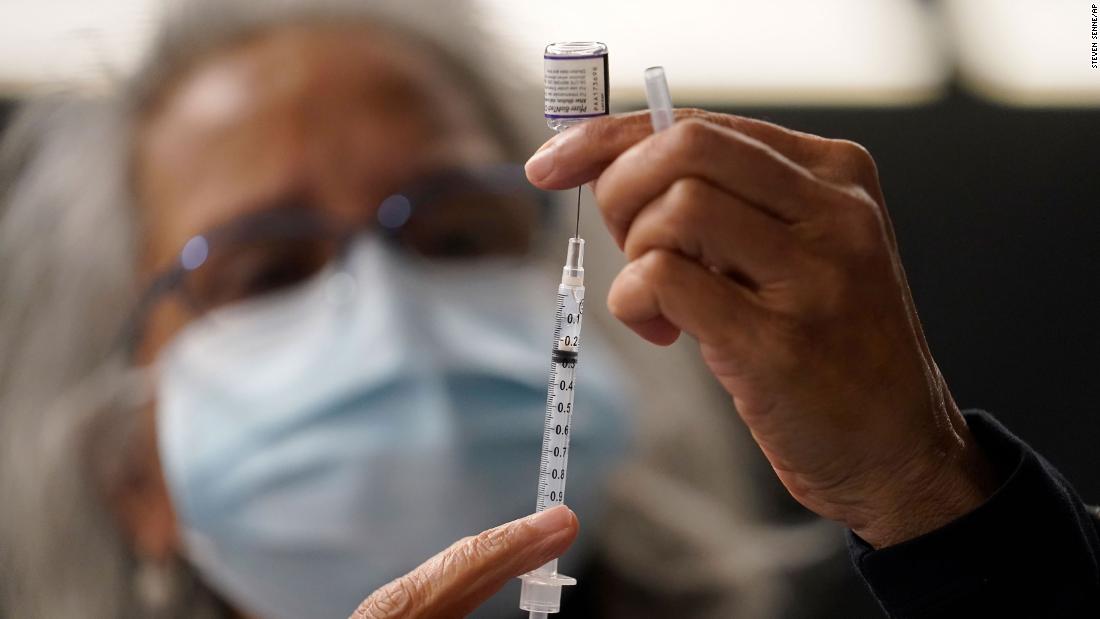Samples from people who had two doses of the Covid-19 vaccine saw, on average, a more than 25-fold reduction in neutralization ability against the Omicron variant than the earlier virus, “indicating that two doses of BNT162b2 may not be sufficient to protect against infection with the Omicron variant,” the companies said.
The companies said two doses may still provide protection against severe disease.
“Although two doses of the vaccine may still offer protection against severe disease caused by the Omicron strain, it’s clear from these preliminary data that protection is improved with a third dose of our vaccine,” Pfizer Chairman and CEO Albert Bourla said in a statement. “Ensuring as many people as possible are fully vaccinated with the first two dose series and a booster remains the best course of action to prevent the spread of COVID-19.”
The initial lab studies used serum from blood from individuals who received two or three doses of the Pfizer/BioNTech Covid-19 vaccine. The sera was collected from subjects three weeks after their second dose, or one month after a third dose. The data released Wednesday has not been peer-reviewed or published.
“We believe that with the two doses, you still have relevant protection for severe disease, but clearly the drop is antibodies is substantial,” Dr. Mikael Dolsten, chief scientific officer at Pfizer, told CNN Chief Medical Correspondent Dr. Sanjay Gupta on Wednesday. “However, the good news this morning is that our data show convincingly when you get your boost — the third boost — the antibody levels rise 25 fold and are now similar to the originally two dose boost that protected well against ancestral strains as well as Delta.
“Go and get your third boost and you have a robust, quite impressive antibody response as well as a strengthening of the other arm of the immune system, the T cells,” Dolsten said. “That’s really the takeaway … two doses is on the weak end against this new variant, T cells may help you to be protected against severe disease, hospitalization — but it’s really time to get the third boost.”
President Joe Biden called the preliminary results “very, very encouraging.”
“I have some good news this morning that Pfizer’s lab report came back saying that the expectation is that the existing vaccines protect against Omicron but if you get the booster you’re really in good shape. So that’s very encouraging news,” Biden told reporters on the South Lawn Wednesday.
“That’s the lab report. There’s more studies going on but that’s very, very encouraging.”
“My impression is if you get a booster you are protected, especially against severe disease,” Sigal said.
Since reports of the Omicron variant emerged in late November, US health officials have urged people to get vaccinated and boosted. Last week, the US Centers for Disease Control and Prevention began recommending all adults get a Covid-19 vaccine booster.
Adults who have had the Pfizer or Moderna Covid-19 vaccines are eligible to get a booster six months after their second shot. Those who got the Johnson & Johnson one-shot vaccine are eligible for a booster of any authorized vaccine two months after their first dose.
About a quarter of adults who are vaccinated against Covid-19 have also received a booster dose, according to CDC data. More than 144 million adults should get a booster, based on CDC guidance, but only about 48 million adults have received one.
Pfizer and BioNTech also said Wednesday they are continuing to develop a variant-specific vaccine for Omicron and it will be available by March, if it’s needed.
“I’m not sure that we’ll need it because it’s one very likely scenario that the current booster will be enough to maintain protection, but if we need one, I’m sure we can make one and the good news is that we will have it by March,” Bourla said on NBC’s “Today” show on Wednesday.
CNN’s Deidre McPhillips, Naomi Thomas and Amanda Sealy contributed to this report.







More Stories
Heart-healthy habits linked to longer life without chronic conditions
Hoda Kotb Returns To TODAY Show After Handling Daughter’s Health Matter
Exercise 1.5 times more effective than drugs for depression, anxiety